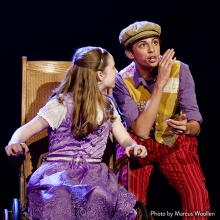The MTI office will close at 1 PM ET on Friday, May 23rd and remain closed through Monday, May 26th in observance of Memorial Day. Office operations will resume on Tuesday, May 27th.
Filichia Features: He’s HANS CHRISTIAN ANDERSEN

Filichia Features: He’s HANS CHRISTIAN ANDERSEN
Choreographers who want to move beyond tap, ballroom and kicklines should investigate Hans Christian Andersen, a future release from MTI.
This musical gives them the chance to stage ballets in addition to production numbers.
Frank Loesser, between Guys and Dolls and The Most Happy Fella, penned eight songs for the 1952 film. He received raves; scriptwriter Moss Hart didn't.
So in 1974, Beverley Cross wrote a brand-new book and had Tommy Steele, his Half a Sixpence star, portray Hans. What was conceived as a Christmastime entertainment for London ran 11 months and returned in 1977.
Still, Cross eventually decided that returning to Hart's original script and making tweaks would be better still. With the help of both Steele and John Fearnley (a 1963 Tony Best Director nominee for a Brigadoon revival), Hans Christian Andersen is now in its best-ever shape.
In early 19th century Denmark, Hans Christian Andersen makes his living as a cobbler, but feeds his soul by telling stories to neighborhood children, such as "Thumbelina," Loesser's take on Andersen's 1835 tale. She's a girl "no bigger than my thumb," but, Hans insists, "When your heart is full of love, you're nine feet tall."
In the film, the song simply entertained a young girl. Here it has more meaning, for it soothes Anna, a girl who's substantially smaller than her peers.
That the kids skip school to hear Hans' stories infuriates their teacher. He gives the town fathers an it's-him-or-me ultimatum.
Peter, an orphan who's become Hans' apprentice, argues that Hans's stories educate (which they do). But the kids are herded into school and do arithmetic lessons set to Loesser's glorious countermelody to Hans's observations on "The Inch Worm." He notes the insect's "measuring the marigolds" should also include its seeing "how beautiful they are."
Hans and Peter head to "Wonderful Copenhagen." There Hans catches a love-at-first-sight glimpse of Madam Doro, The Royal Ballet's prima ballerina.
Peter tries to gets Hans to concentrate on cobbling, not courting. So when Peter overhears Niels, Madam Doro's director, and Otto, her producer, arguing over the star's demands for new toe-shoes, he interjects that Hans can make them.
Love-struck Hans is happy to provide.
In the film, Doro's demands are solely meant to infuriate Niels, who's also her husband. In this musical, she actually needs them.
The love-hate relationship that Doro and Niels had in the film remains. The hate flows when they work, but off-stage, they sing "No Two People (Have Ever Been So in Love)."
The movie only had this song as Hans' fantasy, where he duetted with Doro. That'll happen here, too - only later, making for a nice reprise.
For now, Hans mourns Doro's marital status. He believes he'll always want her "Anywhere I Wander." While he sings this beautiful Loesser ballad, he imagines Doro in another ballet - one based on the story he writes just for her: "The Little Mermaid."
In the film, his pages reach her by being carried by the wind into her window. Here, more convincingly, when Doro and Niels come to thank Hans for the shoes, they see he's written the story.
"Thumbelina" and "The Little Mermaid" aren't the only stories that show Hans' empathy. When he encounters young Lars, who's mocked because his head had been shaved bald for medical reasons, Hans tells him about "The Ugly Duckling." Loesser created a charming version of Andersen's 1843 story.
The editor of the local paper is Lars' father, who's grateful for Hans' help. The film had him already put to press the story his son had told him in his own words; here he asks Hans to write it - a more believable situation.
Hart had Niels lock Hans in a prop room lest he disturb Doro at the premiere of "The Little Mermaid" ballet. Here's a much better scenario: Hans is asked to narrate the tale. (The ever-so-practical Peter works out the financial terms.)
It's such a hit that Hans's hometown warmly welcomes him back. No, he doesn't get the girl, but he does get a new career as a successful story-teller, as is evidenced by "The King's New Clothes." (Loesser's marvelous riff on Andersen's 1837 "The Emperor's New Clothes" has a terrific bit of wordplay near song's end.)
Your audience will also enjoy seeing "The Little Mermaid" in a new medium and with details not found in the now-famous Disney film. If the ballets sound daunting, the script states that pantomimes can be used instead.
In other words, do whatever's easier in telling the story of Hans telling stories.
You may e-mail Peter at pfilichia@aol.com. Check out his weekly column each Monday at www.broadwayselect.com and Tuesday at www.masterworksbroadway.com . He can be heard most weeks of the year on www.broadwayradio.com.

























